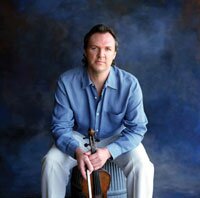INTERVIEW- Voila: O'Connor bridges folk and classical

O'Connor: "It's an interesting time to have someone like me so into American music with our standing in the world right now."
PUBLICITY PHOTO
Some 20 years after he started making records, fiddle player Mark O'Connor hit pay dirt in 1996 with Appalachia Waltz, a critically acclaimed quasi-classical fiddle album made with the help of cellist Yo-Yo Ma and bassist Edgar Meyer.
Now, another dozen or so years later, O'Connor has grown from a master of four-strings into a master of many, and demand for his compositional skills has been steadily increasing. His current trio revisits that material with a viola in place of Meyer's bass, and he even co-opted its primary melodic themes for a major symphonic piece last year. But now he's ready to move on to even larger projects.
The Hook: Do you ever feel like you have to strive for novelty because your instrument is tied to hundreds of years of tradition?
Mark O'Connor: Yeah, I address that every day.
The Hook: Yo-Yo Ma– how did he interact with your own intentions for Appalachia Waltz?
Mark O'Connor: I remember Yo-Yo interviewing me quite a bit in the beginning of our relationship because he wasn't familiar with American music. I had to bring American fiddling into the classical music tradition.
The Hook: Do you wince a little when people call jazz the quintessential American musical style?
Mark O'Connor: Well, I love jazz, and have my own jazz group called Hot Swing. [The guitarist Frank Vignola will be at Gravity Lounge on May 15–editor.] It's a quintessential art form. It'd be hard to find a great American fiddler who didn't have a working knowledge of swing and jazz.
The Hook: Don't you feel like Copland is a little closer to what you're trying to do?
Mark O'Connor: I don't know that I'd have even thought about composing for a symphony orchestra without Copland being one of our great masters.
The Hook: But beyond that, you see yourself as doing something fundamentally different?
Mark O'Connor: I'm trying to develop the notion of a new American classical music. There's a huge folk tradition that's not really represented yet. That's why I'm doing a lot with education and outreach programs– my own string camps– and I'm creating a whole series of books to train musicians from the very beginning that would parallel the Suzuki method, but it would be the American string method.
The Hook: At what point in its development does a culture or country need something like this?
Mark O'Connor: Frankly, we have so many musical traditions, it's mind-boggling. We dominated in the ability to contribute for the last hundred years. [With] all the great musical developments we've been able to produce from these shores– bluegrass, swing, rock and roll– for us to not have a classical music tradition is very odd.
The Hook: Is it fair to consider this a mission statement?
Mark O'Connor: I told an interviewer from a major classical magazine about my fiddle camps, when I first started them, that I hoped to have cellos there someday. He laughed and said, "I can't imagine them sticking their endpins into the dirt." That comment was a microcosm of the hurdles. The only reason why cello wasn't incorporated in the early music of America is that it wasn't easily transportable. People were on the move, and the small size of the violin was one of the luckiest things to ever happen to American music.
The Hook: You're bridging folk and classical music with this, but is that an inherently more difficult pairing than other types of– pardon the term– fusion?
Mark O'Connor: The length of time it takes to compose these pieces and to find the players to play them is certainly a lot longer than a lot of the fusion projects you're bringing up where you just put two people in a studio and push "record" and get a track within a few hours. You're talking about the difference between hours of fusion and years of fusion. But I'd actually prefer the word "fusion" to "crossover." You could argue that all great traditional American music was a fusing of previous sounds. It takes more creativity for two things to really become a third thing.
The Hook: I'll bet this all makes you feel very patriotic.
Mark O'Connor: It does. There are no bones about it, it's a nationalistic music effort. There's something inherently beautiful about music that embraces its surroundings so well that it has a real chance to become universal.
Mark O'Connor performs at the Paramount Theater on May 9 at 8pm. $33.50-$44.50.
#